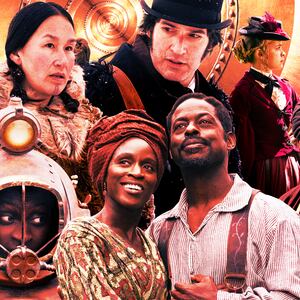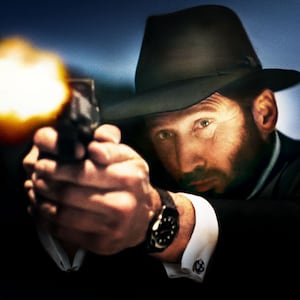The Fantastic Four: First Steps’ title is amusingly misleading, given that Matt Shakman’s spectacular isn’t Marvel’s maiden attempt at bringing its iconic family of superheroes to cinematic life.
Alas, following okay-to-awful efforts in 1994, 2005, 2007, and 2015, the fifth time doesn’t quite prove to be the charm, as the studio’s reboot of the pioneering quartet is an aggressively fine intergalactic adventure whose earnest optimism and sweetness flirts—faithfully and dully—with hokiness. Getting the franchise’s forthcoming phase off on a wobbly foot, it won’t usher in a new MCU golden age.
The reason no one in prior Marvel outings has any memory of these historic do-gooders is that The Fantastic Four: First Steps, which hits theaters July 25, takes place in a parallel-universe Earth 828 that’s in the swing of a retro-futuristic 1960s marked by Space Age décor, designs, and gadgets that would be right at home in an episode of The Jetsons—or, more precisely, the original comics of legendary creator Jack Kirby, whose spirit is only fleetingly present in this wannabe-blockbuster.
The proceedings’ period-piece flair extends from its use of split screens to a brassy, bouncy Michael Giacchino score, as well as to an opening episode of the Ed Sullivan-y The Ted Gilbert Show that, on the fourth anniversary of the Fantastic Four’s inception, offers a handy recap of their origins as astronauts who, on a voyage of space exploration, encountered cosmic dust and returned with extraordinary abilities.

As is tradition, Reed Richards (Pedro Pascal) is the logical body-stretching leader, Sue Storm (Vanessa Kirby) is his compassionate Invisible Woman wife, Johnny Storm (Joseph Quinn) is Sue’s cocky playboy Human Torch brother, and Ben Grimm is Reed’s bedrock BFF The Thing (Ebon Moss-Bachrach).
Josh Friedman, Eric Pearson, Jeff Kaplan, and Ian Springer’s script synopsizes fast, complete with snippets of the team’s prior battles against a variety of enemies (notably, a scene-stealing Paul Walter Hauser as Harvey Elder, aka Mole Man). Simultaneously, it concentrates on Reed and Sue’s latest and greatest mission: becoming parents to a baby boy.
This is wonderful news for the Fantastic Four and just as terrific for everyone else, since the squad is beloved worldwide and is now destined to carry on safeguarding mankind for another generation—even if, per apprehensive Reed’s extensive tests, the child shows no prenatal signs of having superpowers.
Though The Fantastic Four: First Steps is swift, its decision to summarize its backstory means that it struggles to establish its protagonists. Pascal and Kirby are fairly assured as the clan’s de facto daddy and mommy, with the former suitably loyal to, and plagued by, his rationality, and the latter the warm sun around which the rest of the characters orbit.

Still, Ben’s sadness over losing his human form is cursorily referenced, as is Reed’s guilt over having inadvertently transformed Ben into a monster. Even less developed is Johnny’s ladies’ man brashness, which is mentioned once or twice but never genuinely expressed by Quinn’s bland performance.
There’s significant imbalance to the team, with Kirby often seizing the spotlight, including by giving birth mid-flight in a cartoony variation on the actress’ 2020 drama Pieces of a Woman. However, if never given requisite breathing room to create a winning dynamic, they remain a relatively agreeable group of heroes.
The Fantastic Four: First Steps gets going with the unexpected appearance of the chrome-encased Silver Surfer (Julia Garner), who heralds the imminent arrival of Galactus (Ralph Ineson), a planet-devouring goliath intent on making Earth his next meal. Deducing that this threat is legitimate, Reed and company head to the distant reaches of the galaxy to meet face to face with this pseudo-deity, and quickly realize that they’re no match for him or his metallic emissary, whom they narrowly escape by cunningly trapping her in a black hole.
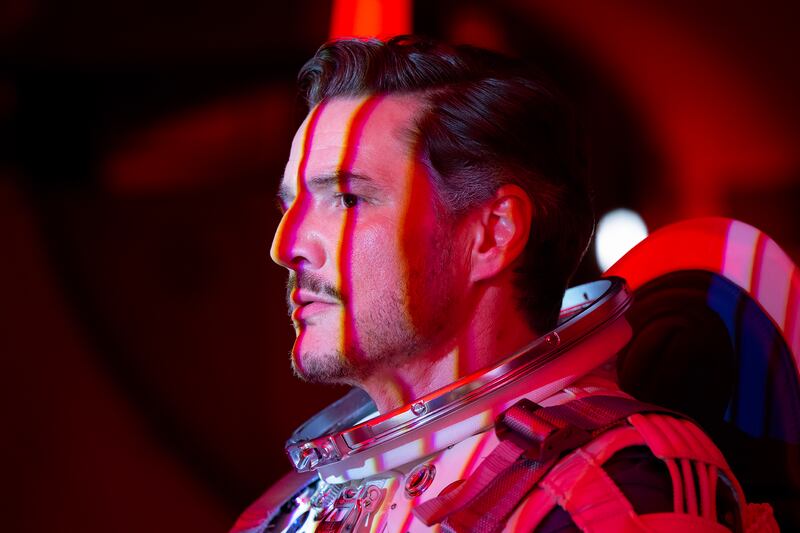
In this and other similarly IMAX-sized set pieces, Shakman captures a touch of Kirby’s psychedelic visual majesty. Yet as is frequently the case with Marvel, the CGI work is hit-or-miss, marred by some ungainly rear-projection effects and the fluctuating sharpness of the Silver Surfer’s visage.
Considering their theatrical-release proximity, The Fantastic Four: First Steps naturally invites comparisons to James Gunn’s Superman, with which it shares a bright primary color palette and a belief in traditional values of togetherness, sacrifice, and kindness as the antidote to selfishness and cruelty.
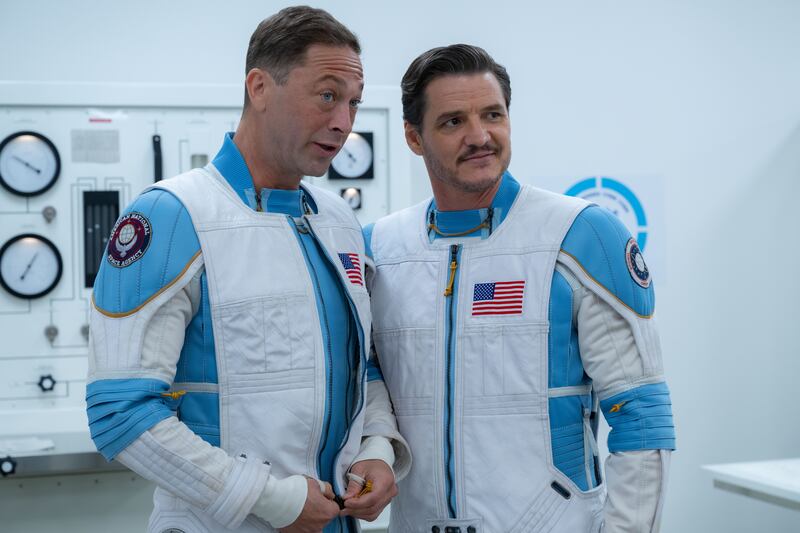
Courtesy of its streamlined and self-contained narrative, those notions resonate more movingly in Shakman’s saga. Nonetheless, the film is rather shallow when it comes to actual emotions; for all its attempted heartstring-pulling, it’s difficult to feel more than superficial investment in, and admiration for, the foursome’s daring exploits, which are hampered by a dearth of slam-bang sequences in which Reed, Sue, Johnny, and Ben use their powers in thrilling tandem—or, for that matter, bother to have Mister Fantastic and The Thing do much of anything.
If The Fantastic Four: First Steps isn’t pulse-pounding exciting, it’s bolstered by chic production design, upbeat attitude, and likable turns from Pascal and Kirby, who compensate for their protagonists’ thinness with charming charisma. It’s additionally aided by Galactus, whose comic-accurate depiction as an interstellar giant with an insatiable, pitiless hunger lends the action a pleasing pulp grandeur which peaks during a final confrontation in the heart of Times Square.
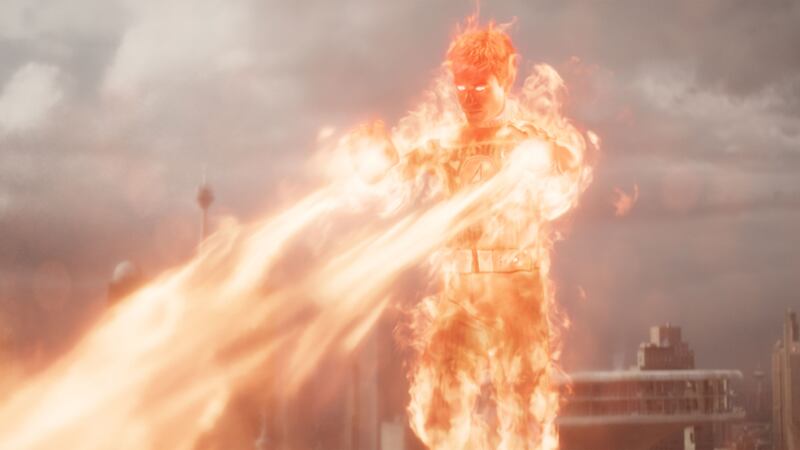
With this climactic battle, the film truly gets going, even as it begins setting the table for subsequent MCU outings via Reed and Sue’s tyke, whose importance to Galactus hints at his upcoming role as a powerful being sought by other classic villains.
By rewinding to the ’60s, the decade that gave birth to these characters, The Fantastic Four: First Steps seeks solid ground, yet for all its style, there’s rarely a moment when its world seems substantial. Worse, it exerts minimal energy trying to be funny; aside from a couple of ho-hum quips that land with a thud, witty one-liners are non-existent.
It’s not that the Fantastic Four are bores, exactly, but they’re also far from distinctive and captivating heroes capable, at on the basis of this thin endeavor, to shoulder the load of being the MCU”s current and future A-listers.


